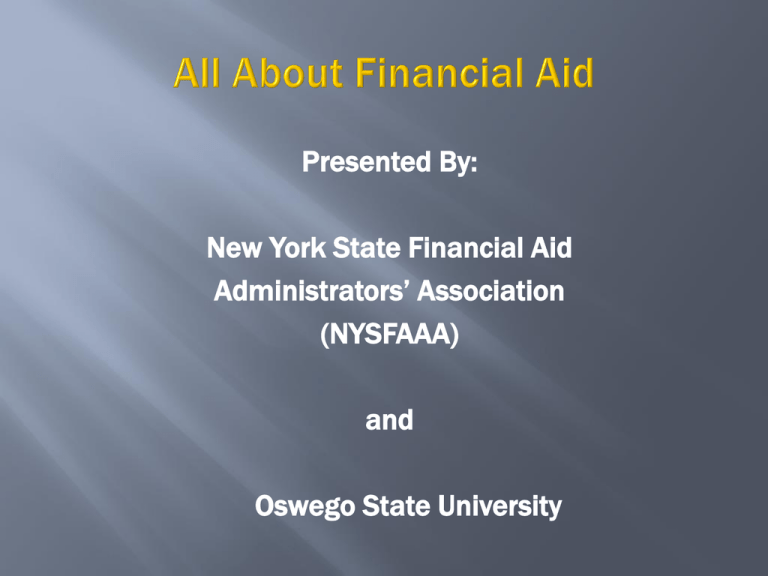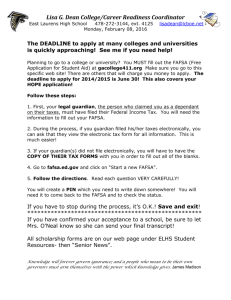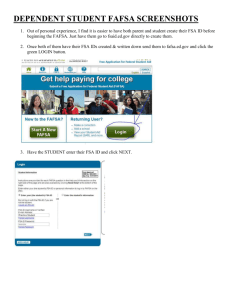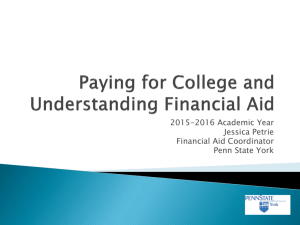Financial Aid Night 2015
advertisement

Presented By: New York State Financial Aid Administrators’ Association (NYSFAAA) and Oswego State University Kathy Flaherty Assistant Director, Financial Aid SUNY Oswego How Much Will It Cost What Aid is Available Family Contribution Financial Need Applying: FAFSA Financial Aid Timeline Special Circumstances Other Resources Questions The Money Tree Myth Family Resources Financial Aid Scholarships Grants Self-Help Student Loans Job Parents Payment Plans College: Investment in student’s future More than just tuition, books Costs vary by type of college Community College Public College Private College Look at costs for entire education Associate’s degree, Bachelor’s degree and beyond…. Tuition and Fees Books & Supplies Room (Housing) Board (Meal Plan/Food) Transportation Some Personal Costs Loan Fees Study Abroad Tuition Fees Books & Supplies Room & Board SUNY Community College Private college $ 6,500 $ 4,500 $ 29,000 1,400 500 1,400 800 800 1,000 12,900 2,000 commute 12,900 Travel 600 2,000 800 Personal 800 700 600 2 Misc Total $ 23,000 $10,500 $ 45,700 Cost of Attendance Expected Family Contribution (from FAFSA) Private Resources = Financial Need Amount of Financial Need determines federal aid received * Note: Colleges may not be able to offer enough aid to meet your financial needs Job Grants Scholarship Loans Funds provided to students/families to help pay for college expenses Includes Scholarships Grants Loans Employment Pell Grant Need Based Current Maximum is $5775/year Supplemental Educational Opportunity Grant Need Based Priority to Pell recipients Targeted at lowest incomes Varies between colleges $100 - $4000 annual award Teacher Education Assistance for College and Higher Education 75% percentile on admissions test/3.25 GPA Currently @ $3700/ year Must agree to teach at least 4 years High need subject area Low-income school Failure to complete requirement Grant becomes interest bearing loan (unsubsidized) Tuition Assistance Program (TAP) Attend College in New York State Award Range $500@$6200 NY State Net Taxable Income < $80,500 New York State Scholar Part-Time Grants Educational Opportunity Program (EOP)/HEOP Merit vs. Need Academic, Athletic, Talent, etc Awards Vary Use FAFSA and/or college applications Questions to ask: Part of Admissions process ? Separate Application? Renewable? With what conditions Use reputable websites Your high school guidance office www.finaid.org www.fastweb.com Watch for deadlines Local civic organizations Parents’ place of employment Federal Direct Stafford Loans (Student) Federal Direct PLUS Loan (Parent) Alternative Student Loans (Private) Direct Loan Year in School determines max Subsidized Financial need required Interest after leaving school Repayment after leaving school 6 months Unsubsidized Interest while in School Currently 4.29% Repayment after leaving school 6 months Perkins Loan Discontinued! Parent’s loan Family income not a factor Cost of Attendance less financial aid awarded Good credit history required Repayment Options If credit history is not good, see financial aid officer Principal and Interest now Interest only now Payment when student leaves school (Not Recommended Current rate = 6.84% Processing fees apply (Now 4.272%) Federal Work Study Institutional Job programs Many benefits Connect to College Reduce reliance on parents Money management Financial literacy skills Good job skills Limited Funding Awards vary by College Types Federal Work Study Federal Supplemental Educational Opportunity Grant Types FAFSA and PROFILE New York TAP College’s Scholarship Watch for deadlines/priority dates Update estimated income Re-apply each year Apply for an FSA ID Both student and parent Complete 2016-2017 FAFSA Free Application for Federal Student Aid January 1, 2016 Update estimates with actual data Use FAFSA4caster for early information Early Results www.fafsa4caster.ed.gov Electronic signature for FAFSA Loan application Access National Student Loan Database (NSLDS) Loan History Protect your number https://fsaid.ed.gov/npas/ind exhtm Sign FAFSA electronically Not required, but speeds processing May be used by students and parents throughout aid process, including subsequent school year Only the owner should create a FSA ID Website: www.fafsa.gov 2016–17 FAFSA on the Web available on January 1, 2016 FAFSA on the Web Worksheet: Used as “pre-application” worksheet Questions follow order of FAFSA on the Web www.fafsa.gov The status message on this page indicates early Title IV eligibility for the student based on their valid Social Security Number, citizenship status, and drug convictions. • Error messages are shown in a RED box at the top of the page and lists multiple errors at one time. • The error graphic is also shown next to each question that will need to be answered or corrected. • If the student’s parent is single, divorced, or widowed, the student will only see questions for the one parent. • The Virtual Keyboard icon is present for the parent’s Social Security Number and Date of Birth. While completing FOTW, applicant may submit realtime request to IRS for tax data IRS will authenticate taxpayer’s identity If match found, IRS sends real-time results to applicant in new browser window Applicant chooses whether or not to transfer data to FOTW Some will be unable to use IRS DRT Examples include: Filed an amended tax return No Social Security Number (SSN) was entered Student or parent married but filed separately Available early February 2016 for 2016–17 processing cycle Participation is voluntary Reduces documents requested by financial aid office The confirmation number will contain the student’s randomly generated identification number. This will replace the student’s current confirmation number which is composed of their Social Security Number and first two letters of their last name. CPS notifies student of FAFSA processing results by: Email notification containing a direct link to student’s online SAR if student’s email was provided on paper or electronic FAFSA Student with FSA ID may view SAR online at www.fafsa.gov Calculated from a Federal formula and the FAFSA/PROFILE form Uses: Family Contribution result is index number Parent income and resources Student income and resources BUT NOT what the family will pay Remains the same regardless of college price tag Used by Colleges to award financial aid Evaluate Financial Aid Offers Receive Financial Aid Award Letter Family Collects Information Review Student Aid Report Fill Out FAFSA4caster Complete FAFSA online January February Financial aid award packages mailed April Complete FAFSA March Apply for FSA ID Research private scholarships Compare award notices May Make college choice Verification Special Circumstances What is “family” ,“parent” Financial Independence Academic Progress Lifetime Aid Eligibility Promissory Notes Cannot be reported on FAFSA Contact financial aid office(s) Examples of special circumstances Change in employment status Medical bills not covered by insurance Change in parent’s marital status Unusual dependent care expenses Student is unable to obtain parental information due to incarceration, abusive situation or no relationship with parents Veterans Educational Benefits Post 9/11 GI Bill Transfer to Dependents Yellow Ribbon Program Resident Assistantships Time Payment Plans Offered by Colleges Less costly than borrowing College Savings Plans (529) New York Saves Application Workshops Financial Aid Offices Websites www.finaid.org https://www.hesc.ny.gov/content.nsf www.oswego.edu/financial Borrowing for College Investment in the future What is a loan Don’t overborrow Credit cards Use and misuse Building good credit Bank Account Direct Deposit Career Services Earnings vs. debt repayment Federal American Opportunity Credit Up to $2500 Life-long Learning Credit Up to $2000 State New filing dates 2017-2018 FAFSA available October 1, 2017 Many Questions TAP not ready Prior Year Data 2015 year data used this year and next It is never too early to start the college planning process The more information you have, the easier the process will be for you and the student Use calculators Family contribution Interest payments Free application assistance is available Stay informed Ask questions! Search for Scholarships Apply for Aid Be Aware of Deadlines Consider Less Expensive School/Commute? Use Tuition Payment Plans Consider Loans Carefully Use Tax Credits





